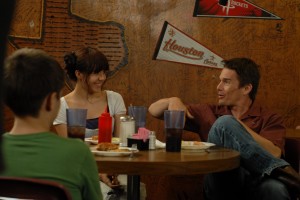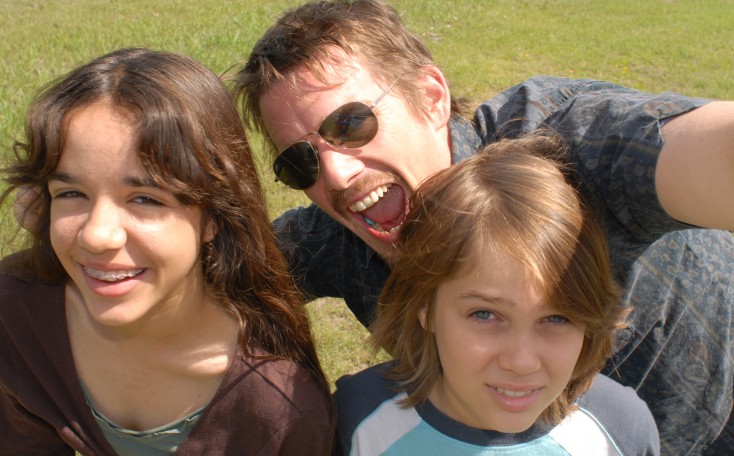
Mason (Ellar Coltrane), age 11, Samantha (Lorelei Linklater), and Mason Sr. (Ethan Hawke) in Richard Linklater’s BOYHOOD. ©IFC Films. CR: Matt Lankes.
By ANGELA DAWSON
Front Row Features
HOLLYWOOD—Ethan Hawke stars as the father in Richard Linklater’s family drama “Boyhood.” The film is particularly notable because it was shot over the course of 12 years, and centers on the story of 6-year-old Mason (Ellar Coltrane) through changes in his life and family in the span of a decade.
Hawke has worked with Linklater previously on his “Before Sunrise” trilogy (with Julie Delpy), which tracks a couple who meet, reunite years later and then revisit them when they’re married with children. Unlike that trilogy, “Boyhood” is all-encompassing fictional account of a boy’s journey from child to young man in one film.
Co-starring with Hawke is Patricia Arquette (“Boardwalk Empire”), who plays his wife (and ex-wife), newcomer Coltrane as well as Linklater’s own daughter Lorelei, who plays Mason’s older sister. During the course of the film, Mason grows from 6 to 16, and the audience catches pivotal moments in his life, including his parents’ divorce, their remarraiges, moving to different homes and more.
The 43-year-old actor was once married to actress Uma Thurman, with whom he has two children. He is married to Ryan Hawke, with whom he has two other daughters. He recently spoke about the long and unusual process of making “Boyhood,” and what he learned from the experience.
Q: Can you talk about what happened in between the years when you were not filming? Did you keep in contact with the children so there would be a close ties?
Hawke: We didn’t exist. We were unplugged. One year, I went to visit Ellar. His father is a musician and Ellar was a little roadie and I went to go visit him. I remember walking and calling him and saying, “There’s something moving about this sound check.” I think that started the idea of visiting my character as a possible finale. It’s how ideas turn into other ideas. Our father in the narrative was really giving up on being a musician, but there’s always something so touching about a sound check. I don’t know why— a performance to come?
Q: Was there any worry about taking on such an ambitious project. Twelve years is a long time.
Hawke: It gained momentum the more we were in it. Knowing Rick (Linklater, the director), I didn’t have any fear we wouldn’t finish it.
Q: Since you were working on this while doing other movie projects, did it ever get tricky schedule-wise?
Hawke: Yeah, like when we did the bowling scene. I was supposed to be catching a plane, but we had to make sure Lorelai got the strike. Every time I see that shot, the look on my face is, “I’m going to make my plane and not get fired!” Because I had kept it from another production that I was even in Austin (shooting “Boyhood”). They thought I was in Toronto prepping for some other movie.
Q: What do you attribute the success of this yearslong project?
Hawke: We got so lucky. The biggest luck of all, in a lot of ways, was Lorelei and Ellar. We could have never predicted that they would contribute on the level that they both did.
Q: As an actor, what are the benefits of doing a project over 12 years?
Hawke: It’s just so fun to tell a real story about a real family. So much of the problem with most movies is they create a false narrative, so that it has a beginning, a middle and an end that all takes place over six months, but our lives never feel like that. We have moments of grace or moments when we feel something deeply, but it is because of 90 million other things that happen before it, not just that moment. So, I found it’s so enjoyable to tell a story without any lies in it like that. Time is so much a part of what makes you close to people. What is the expression? “You don’t make any new old friends.” Time is what creates trust. We go to do that with each other, and we go to that with the audience. The audience starts to believe these characters because they are watching them experience time with each other.
Q: Do you think you are better actor now than you were when you started this project?
Hawke: I would like to think I’m a better actor now, but I’m just dealing with the hand I have now. I’m not a better actor now; I wish I were. It’s a nice idea. But I’m just a different actor. I can look at “The Explorers,” a movie I did when I was 14 years old, and it’s obvious there are certain things—I didn’t know my way around a sentence, I pronounce my T’s, I’m kind of avoiding the camera. I can sense that. I can see that. I can see tricks that I’ve learned, but there’s something wonderful about being 14.
Q: Was it a challenge to be working with kids?
Hawke: We were placed in a really interesting position to be professional actors to be acting with (inexperienced child actors). It’s a dangerous situation to be in because you can really look like a “movie actor” in the bad way. When you’re next to a neat 12-year-old who’s really just playing things honestly, it’s like, “Why are you making faces? Why won’t you turn to the right?” (He laughs.) I love their naturalism and even the way in which their awkwardness is interesting and it speaks to who they are and who their character is. I found that whole part of it a challenge in a good way.
Q: In watching Ellar’s childhood journey, does it remind you of your own experience growing up?
Hawke: That’s the fun of watching this movie. It makes every person think that. The weird thing about this movie is it’s incredibly unique and specific. Samantha has pink hair. This thing’s happening. It all reminds us, “Oh, I remember when my friend did that.” Our experiences align in the movie. Our experiences are not as unique as we feel them to be. When you’re going through adolescence, if feels very specific to you and your problem. When you’re getting a divorce, it’s really specific. This happened on Wednesday, and if I had only said that on Tuesday. Then, when you step back, you start to see so many people have similar experiences. That’s what I love about this movie.
Q: As a parent, how was your own sex education lecture with your children? Was it a shocking moment or more awkward?
Hawke: It’s amazing to me how much we’re inundated with images of sexuality in every advertising tool that’s used and how much we’re just inundated with that and how hard it is for us to talk about it with our kids. Lorelei and I have known each other since she was a little girl and a lot of our feelings of awkwardness are genuine. We’re both acting and not acting. In my experience as a father, I’m an actor. I’m a Bohemian person. I struggle with especially cross gender. I don’t know why. In a way it’s easier with young men to make jokes about it. It’s such a fine line of how to speak to a young person about sexuality. We, as parents, don’t have a rule book about how to do it. I remember just being absolutely petrified and I put a human sex ed book in my daughter’s room. I just left it in there. It had pictures and diagrams and stuff like that. I just dropped it in there.
Q: So when you left the book in your daughter’s room did she toss it out the door or did she leave it in front of your door?
Hawke: I have a 16 year old daughter now and I’m not allowed to speak to you about her. Sorry, I cannot answer that question.
Q: When you watch this movie, how did you see yourself?
Hawke: When the movie starts, I have this feeling of, “Man, I still look good!” And then I’m like eroohhh (downward spiral sound). It’s fun. Everybody keeps talking about (aging) as if it’s happening all the time to everyone. We can freak out about it, but it’s just reality and it always is. The second you buy a car it’s a used car. That’s the way we are, man.




